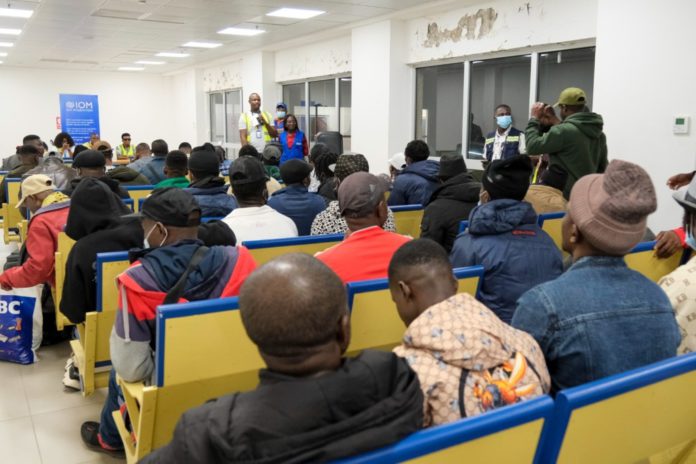Government and the International Organization for Migration (IOM) have pledged to ensure that the 143 Ghanaian migrants who voluntarily decided to return from Libya are properly integrated into society.
The group, consisting of 128 men, 6 women, and 9 children, was welcomed at Kotoka International Airport on Thursday after their aspirations of finding better opportunities in Libya and other European countries were thwarted.
These individuals add to the thousands of African youths who embark on perilous journeys across the Sahara desert to reach Europe via Libya and Niger.
The returnees are part of a larger group of over 5,000 Ghanaians who have received assistance through the Migrant Protection, Return, and Reintegration Programme for Sub-Saharan Africa, led by the International Organization for Migration – Ghana, since 2017.
Under this initiative, the International Organization for Migration, in collaboration with the government, aims to reintegrate the migrants into Ghanaian society.
Speaking to the media, Chief of Mission for IOM Ghana, Fatou Diallo Ndiaye revealed that their support for these returnees extends beyond the airport. Plans are in place to ensure their social and economic reintegration into society.
“Reintegration plan, let’s say not resettlement because they are coming back to their country so yeah the reintegration plan will follow right after the support that we will provide today. The program is more touching on the economical and the social aspects so they will receive any psychosocial support and also any needed support now food and pocket money,” Ms. Fatou Diallo indicated.
She continued that, “After here we’ll meet again with them to see how we can organize their business plans and then also provide them the opportunity to build on from the business plan.”
Representing the government to welcome the returnees, Deputy Minister for Youth and Sports, Evans Opoku Bobie told the returnees that the government has implemented several initiatives they can take advantage of to rebuild their lives.
He said, “the government has created a lot of interventions in this country for the past seven years to give support and assistance to Ghanaian youth. Because they are also Ghanaians, once they are back home, they must also take the opportunities of those interventions. A few examples; the National Entrepreneurship Program. I have advised them to take advantage of these interventions to access some financial assistance so that they can go into their own business and become entrepreneurs.”
“Many of them have come with a lot of experience and skills, so I will urge them not to let the experiences and the skills that they have come with go to waste. Through this government’s intervention, they can put whatever they have come home with into use to help first of all themselves and also help the nation, the Deputy Minister for Youth and Sports added.
IOM Goodwill Ambassador, Musician Kofi Kinaata admonished the returnees to value their life and refrain from embarking on any journey that endangers their lives in their quest to better their lives.
“Assuming as we have gathered here some calls you and tells, come for any amount of money you want but with the condition that you will die the next day; how many of us will proceed and collect the money? You see, no one will go for it. It is not worth it for you to embark on such a dangerous journey in the name of getting money. Whatever money-making adventure where you know your chances of survival are very low, don’t do it. It’s not worth it,” the Things Fall Apart hitmaker admonished.
One returnee, who spoke to JoyNews on condition of anonymity called on all stakeholders to prioritize the economic reintegration of the returnees to discourage them from entertaining the idea of embarking on the treacherous again.
Meanwhile, the IMO Mission Chief is discouraging the youth from using unapproved routes in their attempt to seek greener pastures abroad.
The IOM has supported 5143 Ghanaians comprising 4449 men and 715 women who have voluntarily returned home under the programme since 2017.

